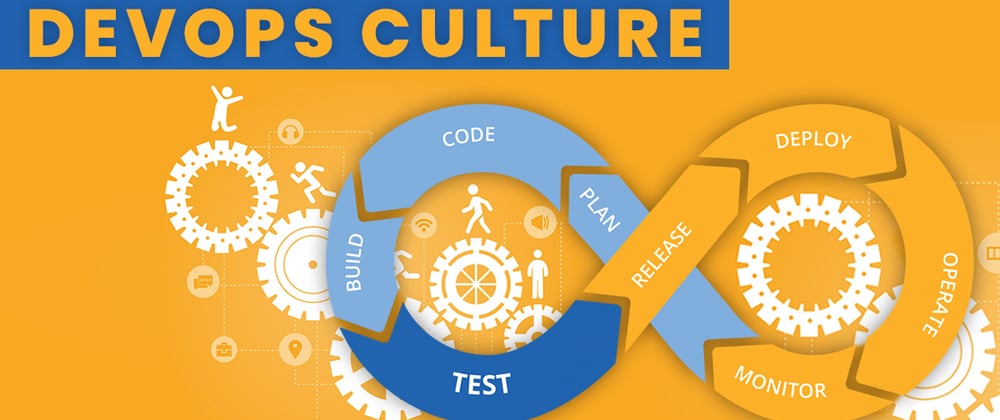“Culture is simply a shared way of doing something with a passion.”
– Brian Chesky, Co-Founder, CEO, Airbnb
To be successful in today's rapidly changing IT business landscape, companies need to build a strong culture. Robust company culture helps to implement newer, innovative methods seamlessly, streamlines internal communication, and increases the longevity of the business organization. Thus, to build a solid business culture, IT companies must include DevOps.
The DevOps culture is heavily rooted in the IT realm as it has immense benefits. It helps companies cope with the fast-paced work environment, enhance quality product output, and limit post-production errors. Moreover, it also helps to decrease the delivery time and shorten the overall turnaround time in the software development process.
Therefore, in this blog, we will discuss different aspects of the DevOps culture and how it helps closely knit the teams together. Moreover, we will also see the benefits of having a DevOps culture and mindset at the workplace.
What is the culture in DevOps?
DevOps, the term, is a combination of two words: development and operations. Although the term first came into existence around 2007, Patrick Debois first coined it in 2009. Traditionally in the IT realm, the development team writes and tests codes while the operations team is in charge of software release and updates.
Both development and operations should work together to deliver a better product, but this was not the case before the inception of DevOps. Thus, this led to slow and disjointed services and unhappy customers.
With DevOps culture in place, the professional relationship between the development and operations team produces astounding results.
DevOps Culture with CALMS Framework
CALMS is an acronym that marks off the five core values around which the DevOps culture is built. CALMS stands for Culture, Automation, Lean, Measurement, and Sharing. Jez Humble first coined the acronym, and it is based on John Willis' CAMS model.
Business organizations use the CALMS model to gauge their success, especially when transitioning from the software production process to DevOps.
Let us understand the model in detail:
Culture
It's a prerequisite for a company to have a culture of collaboration to facilitate successful DevOps. The teams should be oriented so that they care about the entire project and not just about their functions in the company.
To enhance a culture of collaboration within the business company, ensure that the communication between various teams is streamlined (including the remote team). Moreover, select the communication tools that can handle all kinds of dynamic media such as GIFs, videos, and codes.
Along with streamlined communication, continuous feedback is also essential. Thus, set the communication channels that have space for rapid exchange of feedback. There are different feedback and recognition tools available in the market that will help the team set goals and give formal feedback.
Automation
Automation is a secret tool of highly productive teams where DevOps culture principles are implemented. It streamlines all the repetitive tasks, and along with saving time, Automation makes the entire app building process more accurate. Whether catching bugs or security compromisations or running each code through a set of automated tests, Automation does everything to give impetus to the entire development process.
Moreover, since all the repetitive tasks are automated, business organizations require less human power to complete a particular task. Thus, it will be easier for them to define the project and get reasonable cost estimation.
Lean practices
"Simplicity - the art of maximizing the amount of work not done - is essential." - Agile Manifesto Principles. Lean is an Agile framework in software development process that helps iterate the product so that a Minimum Viable Product (MVP) is delivered to the end-customer. The DevOps team then works on the suggestions given by the customers to build a better final product.
Lean work plays a pivotal role in continuous integration and continuous feedback intersection in the DevOps implementation strategy.
Measurements
There is no standard list that helps business organizations to measure the work done in DevOps. Thus, it becomes essential to measure internal processes and their results if the company wishes to measure some specific objectives.
They are:
- Cycle time: time taken to finish each section of the project
- Project lead time: total time the project would take from start to finish
- Burndown charts: These are the charts that show the amount of work left
- Technical: Number of features in the project app, bugs, code coverage, etc.)
- Throughput: total processing time
- Employee sentiment and experience
- Customer satisfaction
Sharing
Business organizations should understand that a DevOps culture doesn't translate into the demise of the development and operations team. The process acknowledges that both departments have vital functions, but there is a need to share their burden to enhance the quality of the software products.
Thus, it is inevitable to foster sharing if the businesses want to have an influential DevOps culture in their organization. It helps break the interdepartmental barriers and allows the employees to be generally available for each other and the customers.
Tips to Build a Successful DevOps Culture at the Workplace
A DevOps team should be much more than a collection of individuals who happen to work on the same project. The business organization must follow guidelines to help their teams more effectively on the shared task and deliver the best results for this to happen.
Below is the list of tips that will help implement the DevOps culture principles successfully at the workplace.
Get the right leadership
It is impossible to build a DevOps team culture if there is not enough support from its leadership. Companies should understand that people who encourage cross-team collaboration must be donning the leadership responsibilities to begin a culture of collaboration. In this way, the leaders will be championing the leading cause of DevOps culture and implement it for the company's benefit.
Moreover, the leaders should refrain from implementing DevOps strategies just for the sake of it. They should understand that DevOps is an organic process that evolves continuously, and it requires patience to build an ethical culture. That is why good leadership is essential, as it will ensure that all the resources are working to their full potential and enable the team to flourish in their own right. Moreover, true leaders will also know when to step back let the employees do their job.
Assemble the right team and encourage cross-team collaboration
To develop a DevOps culture and mindset, your company needs a focused and motivated team. In addition, it is good to have a diverse team as it can also contribute to the overall collaborative culture.
Experienced individuals from different backgrounds can bring a new perspective to the unique team and enable them to create better products. Irrespective of your role in the company, DevOps implementation will embrace the right mindset and allow the employees to bring value to the team.
Have a common goal and work towards it
For a DevOps culture to propel in the business organization, it is necessary that its employees have a common goal, and they work towards it. A shared vision will allow the team members to under the big-picture easily. In this way, the employees can make better decisions during project development and help other team members achieve their goals.
Leadership in the business organization is also essential in helping the team members understand the company's vision. Moreover, the DevOps team should not think of competing goals. Instead, they should communicate goals at various levels in the team to make the outcome even more prolific.
Foster a culture of innovation and learning
There should be 'room for innovation' in the company if it wants to leverage the full benefits of cultivating the DevOps culture and mindset. Provide your employee's space to try new things and make mistakes. Unless the team members are willing to expand their work horizon, you will never know their full potential as a company.
Moreover, having a culture of innovation will also keep the team ahead in adopting new technologies.
Have the right set of tools and technologies
State-of-art tools are a must in facilitating a collaborative culture in an IT company. The right tools and technologies will ensure that each team member will give their inputs in effective continuous integration/continuous delivery (CI/CD) operation.
It is essential to select such tools and technologies that support a high degree of Automation. Without Automation, the team members will be compelled to perform various repetitive tasks manually to prevent their overall productivity. Automated tools will standardize the entire operation and allow the team member to focus more on innovation.
Instill a sense of ownership and shared responsibility
The IT company needs to allow its DevOps team members to work with a sense of ownership. Creating an environment of autonomy within the team will cultivate trust and respect and allow the members to do their job with enough confidence and independence.
In a company where the DevOps culture and mindset are implemented, each team member has direct insights into the project's development, test, deploy, and maintenance. In this way, everyone in the team stays committed to the cause of the project since every team member recognizes that they contribute to delivering the application in the best way possible.
Clear and transparent communication
As an IT business organization, you have to prioritize clear and open communication to help the company in the future. To foster communication, include all the team members in important team meetings and other essential gatherings.
Allow every person in the team to put-forth their point of view while focusing on keeping the team meeting to a minimum both in terms of number and time.
Complete information sharing is essential as it gives every team member a chance to be part of the planning team and give them access to learn new process and technologies.
Have a constant evaluation of progress
DevOps implementation is not a one-off operation; it is a continuous process. Thus, it is essential to have constant improvements and updates while keeping the end goal in mind. Moreover, it is also necessary to evaluate where things stand in the development process at regular intervals.
Constant evaluation will help the DevOps team to learn about the loopholes in the process or the sytem and work on them. Once they iron them out, it automatically increases the overall quality of the product while improving their skills.
Benefits of DevOps culture at the workplace
A neatly designed DevOps implementation strategy has perks of its own. We have listed some of DevOps' prime benefits below:
Reduces risks and wastage
The teams can deploy new software with DevOps while safeguarding the existing ones to ensure reliability during peak times. The agile process also enhances the software's flexibility and provides optimal security to the data inside.
Along with reducing the risks, DevOps culture principles help save the cost of maintenance and lower project complexity and capital expenditure. DevOps also automates the release pipeline that reduces the human resources and allows faster release of the software.
Increases employee engagement
An IT company with solid DevOps implementation has employees who are quick on their feet and highly motivated. The DevOps environment allows the employees to learn quickly and enables them to publish their projects rapidly. Since DevOps enhances overall employee engagement, it keeps the team members in touch base with their peers.
Improved customer experience
Along with increasing employee engagement, DevOps culture plays a significant role in enhancing customer experience as well. Since the employees are more involved in the development process, they will punch above their weight to create a better app with more customer-centric features. As the byproduct of this, the customers will remain more involved in the product.
High-quality products
Good collaboration between the development and operations departments will lead to significant improvement in the quality of the product. In addition, with DevOps culture and mindset, constant user feedback will compel the developers to enhance the quality of the end product.
Better operational efficiency
Automation by every means sits at the core of the DevOps culture. It not only enhances the team's productivity but is also vital in increasing operational efficiency as well. Because of Automation, there is no need to create everything from scratch in a DevOps environment. Moreover, automated processes handle the rapid growth of the product, varying workloads, and keep a check on the changing requirements.
Stable work environment
Implementing DevOps culture principles can render a well-balanced approach and stability to the overall work environment. It minimizes the tension involved during the release of a new feature and curtails the negative impact the tension can have on the productivity of the team. Moreover, it is easier to fix the bugs and update the application for the team members in a stable work environment.
Faster deployment
More frequent and faster delivery of updates and features are vital to keeping the customers interested in your application. Faster deployment enhances the overall customer experience and helps the IT business organization to stand firm in the competitive market.
Rapid problem-solving abilities
DevOps culture renders fast and reliable problem-solving techniques to ensure a hassle-free app development process. DevOps ensures that the solution to the technical errors in software management is stable and thus increases the credibility of the entire process.
Final Words
DevOps services companies follow the philosophy of continuous development and exercise it by every build iteration, small software changes, etc. In addition, implementing DevOps culture principles also helps the IT companies to innovate constantly and render a better user experience to their end customers.
Therefore, it will be safe to say that the future of all businesses and industries is DevOps. It helps IT business organizations to achieve their goals and render advantages that are way beyond their expectations.







Oldest comments (0)